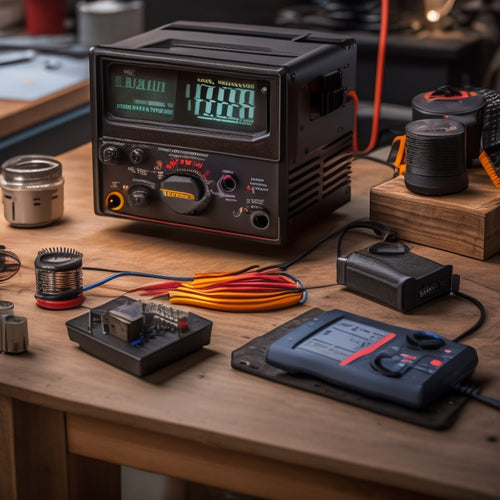
Why Deep Cycle Batteries Are Ideal for Solar
Share
As you explore solar energy, you'll find deep cycle batteries are the essential choice for efficient and reliable energy storage. They're designed for steady energy flow and built to withstand repeated charging and discharging cycles, making them a perfect match for solar power systems. With advancements in technology, their efficiency has improved greatly. From maximizing energy harvest to reducing waste, deep cycle batteries play an important role in solar energy systems. And, as you dig deeper, you'll discover more about their features and benefits that make them an essential component of a sustainable energy solution.
Key Takeaways
• Deep cycle batteries are designed for steady energy flow and can withstand repeated charging and discharging, making them ideal for solar applications.
• They provide efficient and reliable energy storage, enabling maximized energy harvest and reduced waste in solar energy systems.
• Deep cycle batteries can operate at peak efficiency in extreme temperatures, ensuring reliable energy supply even in hot or cold climates.
• They are built to withstand deep discharge and recharge cycles, making them suitable for frequent charge/discharge cycles in solar energy systems.
• Deep cycle batteries contribute to a sustainable energy source, providing reliable power during grid outages and enabling a seamless transition to backup power.
Deep Cycle Batteries 101
As you explore the world of solar energy, understanding deep cycle batteries is essential, and it all starts with knowing what they're and how they differ from regular batteries.
Deep cycle batteries are designed to provide a steady flow of energy over an extended period, making them ideal for solar applications. Unlike regular batteries, which are designed for short bursts of energy, deep cycle batteries are built to withstand the rigors of repeated charging and discharging.
The history of deep cycle batteries dates back to the 19th century, when lead-acid batteries were first developed. Over the years, advancements in technology have led to the development of more efficient and reliable deep cycle batteries.
When it comes to charging these batteries, there are several charger types to take into account. Pulse width modulation (PWM) chargers and maximum power point tracking (MPPT) chargers are two popular options, each with their own advantages.
Understanding the differences between these charger types is essential in optimizing the performance of your deep cycle batteries. By grasping the fundamentals of deep cycle batteries, you'll be well on your way to harnessing the full potential of solar energy.
Solar Power Energy Storage
When you're setting up a solar power system, you need a reliable way to store the energy generated by your solar panels. That's where solar power energy storage comes in, allowing you to store excess energy for later use.
With a well-designed energy storage system, you'll enjoy a stable power supply even when the sun isn't shining.
Energy Storage Systems
You require an energy storage system (ESS) to stabilize the voltage and current output of your solar panel array, guaranteeing a reliable and efficient supply of solar power. This is essential for maintaining grid resilience, especially during periods of high energy demand or when the grid is under stress. A well-designed ESS ensures power reliability by providing a buffer against grid fluctuations, ensuring a stable supply of solar power to your home or business.
When selecting an ESS, consider the type of batteries, inverter, and charging/discharging protocols. Deep cycle batteries, in particular, are well-suited for solar power systems due to their ability to handle frequent charge/discharge cycles.
A high-quality ESS also ensures that your solar panel array operates at peak levels, maximizing energy harvest and reducing waste. By integrating an ESS with your solar panel array, you can enjoy a reliable, efficient, and sustainable source of energy, while contributing to a more resilient grid.
Stable Power Supply
Your deep cycle batteries play an essential role in maintaining a stable power supply by regulating the flow of solar power energy storage, guaranteeing that your home or business receives a consistent and reliable supply of electricity. This is especially significant during periods of high demand or when the grid is experiencing an outage. With deep cycle batteries, you can rest assured that your critical appliances will continue to function smoothly, even when the grid is down.
Here are three key benefits of deep cycle batteries in maintaining a stable power supply:
-
Reliable Grid: Deep cycle batteries can provide a dependable source of power during grid outages, ensuring that your home or business remains operational.
-
Critical Outage Management: In the event of a power outage, deep cycle batteries can provide a seamless handover to backup power, minimizing disruption to your daily activities.
-
Consistent Power: By regulating the flow of solar power energy storage, deep cycle batteries ensure that your home or business receives a consistent and reliable supply of electricity, even during periods of high demand.
With deep cycle batteries, you can enjoy a stable power supply, reduced downtime, and increased peace of mind.
Longer Cycle Life Expectancy
How many charge cycles can you expect from a deep cycle battery before its capacity starts to degrade noticeably? As a solar energy enthusiast, you want to guarantee your battery lasts as long as possible. Deep cycle batteries are designed to provide an extended lifespan, with some models offering up to 5,000 charge cycles or more.
| Battery Type | Cycle Life Expectancy |
|---|---|
| Flooded Lead-Acid | 200-500 cycles |
| AGM (Absorbed Glass Mat) | 500-1000 cycles |
| Lithium-Ion | 3000-5000 cycles |
As you can see, Lithium-Ion batteries offer the longest cycle life, making them an excellent choice for solar energy systems. This extended lifespan is due to the battery's ability to withstand deep discharge and recharge cycles without significant capacity loss. This means you can enjoy a stable power supply for years to come, reducing the need for frequent replacements and minimizing waste.
With deep cycle batteries, you can expect a longer cycle life expectancy, ensuring your solar energy system operates efficiently and reliably. This extended lifespan translates to lower maintenance costs and a reduced carbon footprint, making deep cycle batteries an ideal choice for solar energy systems.
High Discharge Rate Capability
Deep cycle batteries are designed to handle high discharge rates, allowing them to supply a large amount of power quickly, making them well-suited for applications where a sudden surge of energy is required, such as during peak morning and evening hours in off-grid solar systems.
When considering deep cycle batteries for your solar setup, understanding their high discharge rate capability becomes crucial. This feature enables the battery to provide a rapid flow of energy when needed, which is critical in situations where a power surge is required. For instance, when you're running multiple appliances simultaneously, a deep cycle battery can handle the rapid depletion of power without compromising its performance.
Here are three key benefits of deep cycle batteries' high discharge rate capability:
-
Rapid power supply: Deep cycle batteries can supply power quickly, making them ideal for applications where a sudden surge of energy is required.
-
Reliable performance: Their high discharge rate capability ensures that the battery can handle rapid depletion of power without compromising its performance.
-
Efficient energy storage: This feature enables the battery to store excess energy generated by your solar panels, allowing you to tap into it when needed.
Low Maintenance Requirements
In addition to their high discharge rate capability, deep cycle batteries for solar systems offer the advantage of low maintenance requirements, allowing you to focus on optimizing your solar panel performance rather than constantly monitoring the battery's condition.
You'll appreciate the reduced upkeep needs of deep cycle batteries, which are designed with corrosion protection in mind. This means you won't have to worry about the battery's internal components deteriorating over time, freeing you up to focus on other aspects of your solar system.
Another benefit of deep cycle batteries is their built-in battery monitoring capabilities. This allows you to keep tabs on the battery's state of charge, voltage, and temperature, ensuring you're always aware of its performance. With this information, you can identify and address any issues before they become major problems, further reducing maintenance needs.
Wide Operating Temperature Range
As you consider deep cycle batteries for your solar setup, you'll want to think about the temperature range they can handle. A wide operating temperature range is essential, as it directly affects the battery's performance and lifespan.
You'll need to evaluate how well the battery performs in high temperatures, low temperatures, and how it manages heat efficiently.
High Temperature Performance
You'll often find that deep cycle batteries for solar systems require a wide operating temperature range to guarantee peak performance, particularly in high-temperature environments. This is important because high temperatures can greatly impact a battery's lifespan and overall efficiency.
Deep cycle batteries designed for solar systems are engineered to withstand extreme temperatures, ensuring excellent performance even in scorching hot environments.
Here are some key benefits of deep cycle batteries with high temperature performance:
-
Heat Resistance: These batteries are built with heat-resistant materials that can withstand temperatures above 40°C (104°F), making them ideal for hot climates or areas with high ambient temperatures.
-
Thermal Durability: Deep cycle batteries are designed to maintain their performance and lifespan even when exposed to high temperatures, ensuring reliable energy storage and supply.
-
Peak Performance: By enduring high temperatures, these batteries can operate at peak efficiency, providing a stable and efficient energy supply for your solar system.
Low Temperature Performance
While high temperatures are a concern, deep cycle batteries for solar systems must also perform well in low-temperature environments, as their operation often spans a wide temperature range, typically from -20°C to 40°C (-4°F to 104°F).
You'll find that deep cycle batteries designed for solar systems are built to withstand cold climates, ensuring peak performance even in freezing temperatures. In fact, many deep cycle batteries are engineered with frost protection features to prevent damage from ice crystal formation. This is particularly important in cold climates where temperatures frequently drop below freezing.
When you're relying on solar power, you can't afford to have your battery performance compromised by low temperatures. Look for deep cycle batteries with a proven track record of performance in cold climates. By doing so, you can rest assured that your solar system will continue to operate efficiently, even on the chilliest of days.
With a reliable deep cycle battery, you can harness the power of the sun with confidence, no matter the temperature outside.
Efficient Thermal Management
When selecting a deep cycle battery for your solar system, it's important to choose one that can effectively manage thermal fluctuations, ensuring peak performance across a wide operating temperature range. This is because temperature extremes can greatly impact battery performance, lifespan, and overall system reliability.
To achieve efficient thermal management, look for batteries with advanced cooling systems and heat sink designs. Here are three key considerations:
-
Heat Sink Design:
A well-designed heat sink can effectively dissipate heat, reducing the risk of thermal runaway. Look for batteries with optimized heat sink geometries and materials that facilitate efficient heat transfer. -
Cooling System Optimization:
A well-optimized cooling system can maintain a stable operating temperature, even in extreme environments. This can be achieved through advanced fan designs, air flow management, and smart temperature monitoring. -
Thermal Monitoring and Control:
A robust thermal monitoring and control system can detect potential thermal issues before they become critical. This enables proactive measures to prevent overheating, ensuring reliable operation and prolonging battery lifespan.
Efficient Charge Acceptance
Deep cycle batteries optimized for solar applications typically feature efficient charge acceptance, allowing them to effectively absorb and store energy generated by photovoltaic panels during periods of high solar irradiance. This means you can capitalize on the energy generated during peak sun hours, reducing the likelihood of energy waste. Important charge acceptance is critical, especially when you're relying on solar power as your primary energy source.
When you're dealing with fluctuating energy input, you need a battery that can keep up. That's where rapid recharging comes in. With efficient charge acceptance, your deep cycle battery can quickly absorb energy during periods of high solar irradiance, ensuring you have a steady supply of power when you need it.
Smart charging capabilities also play an important role, as they enable your battery to optimize energy absorption and storage. By minimizing energy losses and maximizing storage capacity, you can enjoy a more reliable and efficient solar power system.
With efficient charge acceptance, you can rest assured that your deep cycle battery is working in harmony with your solar panels to provide a seamless energy experience.
Compatibility With Solar Systems
Your solar power system's performance relies heavily on the seamless integration of its components, and that's why your deep cycle battery's compatibility with your solar system's inverters, charge controllers, and panels is essential for peak energy harvesting and storage.
When selecting a deep cycle battery for your solar system, it's important to confirm that it can integrate seamlessly with the other components. This is where system integration comes into play, allowing your renewable energy system to operate efficiently and effectively.
Here are three key considerations for ensuring compatibility:
-
Inverter compatibility: Make sure your deep cycle battery is compatible with your inverter's charging and discharging protocols to optimize energy storage and release.
-
Charge controller synchronization: Synchronize your deep cycle battery with your charge controller to regulate energy flow and prevent overcharging or undercharging.
-
Panel configuration: Confirm that your deep cycle battery is compatible with your solar panel configuration to maximize energy harvesting and storage.
Cost-Effective Energy Solution
In addition to opting for a deep cycle battery as part of your solar power system, you can enjoy a cost-effective energy solution that reduces your reliance on the grid and minimizes your energy bills. This is particularly beneficial for homeowners and businesses seeking to maximize their renewable energy investment.
With a deep cycle battery, you can store excess energy generated by your solar panels during the day and use it to power your home or office at night or during periods of low sunlight. This not only reduces your energy bills but also increases your energy independence.
Additionally, many governments offer renewable incentives to encourage the adoption of solar power systems, making it an even more attractive option. By investing in a deep cycle battery, you're contributing to energy democracy, where individuals have more control over their energy generation and consumption.
With the cost of renewable energy decreasing, it's an ideal time to invest in a deep cycle battery and reap the benefits of a cost-effective energy solution.
Frequently Asked Questions
Can I Use Deep Cycle Batteries for Backup Power Systems?
You can confidently use deep cycle batteries for backup power systems, ensuring system reliability during power outages, as they provide robust backup solutions for energy security and grid independence.
Do Deep Cycle Batteries Work Well in Cold Climates?
You'll find deep cycle batteries work well in cold climates, but their cold weather performance declines; implement winter storage strategies like keeping them charged and warm to minimize capacity loss during freezing temperatures.
Are Deep Cycle Batteries Suitable for Emergency Lighting Systems?
You'll be interested to know that 95% of power outages last less than 2 hours, making dependable backup systems essential. Deep cycle batteries are suitable for emergency lighting systems due to their high lighting reliability and flexible system design, ensuring uninterrupted power supply during outages.
Can I Mix Old and New Deep Cycle Batteries in a Bank?
When you mix old and new deep cycle batteries, you risk capacity mismatch, age variation, and battery incompatibility, which can lead to voltage disparity, reducing overall performance and lifespan, so it's generally not recommended.
Do Deep Cycle Batteries Require a Special Charging System?
'Will you compromise your deep cycle battery's lifespan by using a generic charger? You shouldn't. To guarantee peak performance, you need a charging system tailored to your battery's specific Charging Protocol, guaranteeing seamless System Integration.'
Related Posts
-

Is This the Future of Alternative Energy Systems
Yes, alternative energy systems are shaping the future of energy. Innovations in solar and wind technologies are driv...
-

High-Efficiency Solar Battery Chargers for Remote Areas
High-efficiency solar battery chargers are essential for your off-grid energy needs in remote areas. They maximize en...
-

Key Features of a DC to AC Converter
A DC to AC converter features high efficiency and conversion rates, which reduce energy costs and improve performance...


